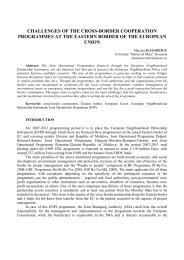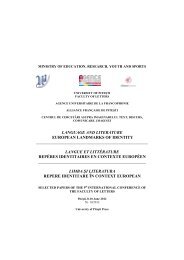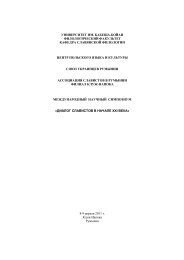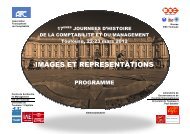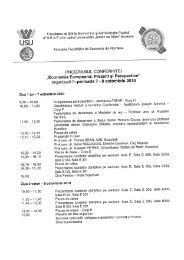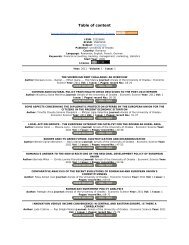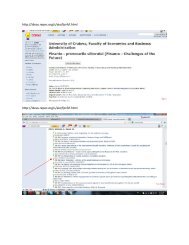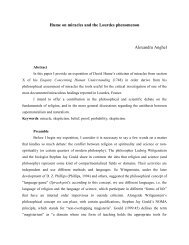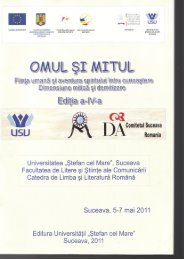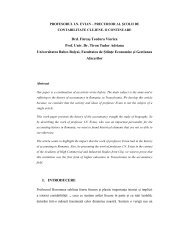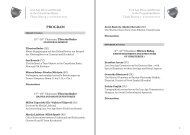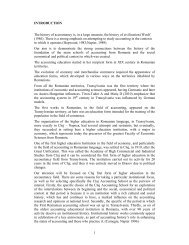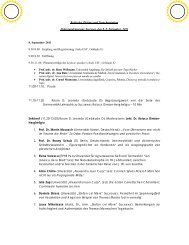La traduction caduque, retraduction et contexte culturel (en ...
La traduction caduque, retraduction et contexte culturel (en ...
La traduction caduque, retraduction et contexte culturel (en ...
Create successful ePaper yourself
Turn your PDF publications into a flip-book with our unique Google optimized e-Paper software.
LA RÉCEPTION ET LA TRADUCTION DE L’ŒUVRE<br />
D’ÉMILE ZOLA EN ROUMANIE JUSQU’EN 1950<br />
Daniela PINTILEI 1<br />
Abstract: At the beginning of its publication, the work of Emile Zola was<br />
known in the Romanian literary universe through the translations and, at the<br />
same time, the literary criticism. In Romania, first appeared the translations of<br />
its short stories and stories. Th<strong>en</strong>, the translations of the novels appeared. The<br />
po<strong>et</strong>ry in Romanian from Rougon-Macquart cycle will compl<strong>et</strong>e the writer’s<br />
portrait. The article refers to the pres<strong>en</strong>tation of the writer’s interception in the<br />
Romanian space and the translators’ portraits that contributed at the<br />
recognition of the novelist’s work in Romania.<br />
Keywords: works of Emile Zola, translation, interception, translators.<br />
<strong>La</strong> réception de l’œuvre zoli<strong>en</strong>ne <strong>en</strong> Roumanie<br />
<strong>La</strong> réception de l’œuvre zoli<strong>en</strong>ne <strong>en</strong> Roumanie est due, <strong>en</strong> grande<br />
partie, aux <strong>traduction</strong>s réalisées <strong>et</strong> à la fois à la critique littéraire<br />
(articles de journaux, comptes r<strong>en</strong>dus, préfaces, histoires littéraires).<br />
L’œuvre de Zola, tellem<strong>en</strong>t controversée <strong>en</strong> France <strong>et</strong> <strong>en</strong> Europe, arrive<br />
dans le panorama littéraire roumain premièrem<strong>en</strong>t à travers les<br />
<strong>traduction</strong>s des nouvelles <strong>et</strong> des récits ; ultérieurem<strong>en</strong>t, les romans qui<br />
font partie surtout du cycle romanesque Les Rougon-Macquart,<br />
connaiss<strong>en</strong>t à leur tour des <strong>traduction</strong>s. P<strong>et</strong>it à p<strong>et</strong>it, la critique littéraire<br />
roumaine parle d’une écriture « zoli<strong>en</strong>ne », des personnages « zoli<strong>en</strong>s »<br />
ou même des écrivains d’influ<strong>en</strong>ce « zoli<strong>en</strong>ne », faisant des<br />
comparaisons critiques, <strong>en</strong> imposant dans la consci<strong>en</strong>ce du public le<br />
nom de l’écrivain français.<br />
Le premier comm<strong>en</strong>taire roumain sur l’œuvre d’Emile Zola est<br />
une chronique élogieuse sur le spectacle avec la pièce Thérèse Raquin,<br />
prés<strong>en</strong>tée par une troupe itali<strong>en</strong>ne sur la scène du Théâtre national de<br />
Bucarest <strong>en</strong> 1881 <strong>et</strong> publiée par Barbu Ştefănescu Delavrancea<br />
dans România liberă 2 . L’année suivante, le quotidi<strong>en</strong> Românul<br />
comm<strong>en</strong>ce à publier <strong>en</strong> feuill<strong>et</strong>on le roman Thérèse Raquin, tandis<br />
1 Université « Ştefan cel Mare » de Suceava, Roumanie, danielapintilei@gmail.com.<br />
2 Journal national fondé <strong>en</strong> 1877.<br />
161



